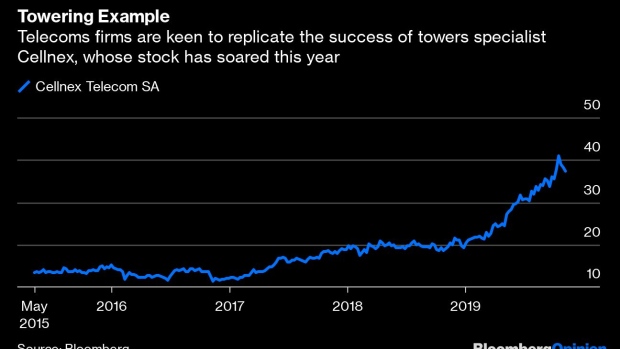Nov 18, 2019
In the Age of 5G, the Hottest Telecom Assets Are... Towers
, Bloomberg News

(Bloomberg Opinion) -- There are plenty of reasons why Deutsche Telekom AG and Vodafone Group Plc make for uneasy bedfellows. But if Europe’s biggest telecommunications firms can overcome their differences, they would benefit from forging a strong alliance for one of their biggest cost centers: towers.
The structures on which mobile operators install their antenna have generated a flurry of dealmaking as valuations soar and European carriers sense an opportunity to reduce debt and costs. By some estimates, towers account for a third of total capital expenditures. Since July, more than $8 billion of deals have been announced in Europe.
Sexy they are not. Yet towers are critical vertebrae for wireless networks, and are ever more in demand with the advent of 5G networks. The new technology, which promises to transmit bigger gobs of data at faster speeds, will depend on antenna with a shorter range than previous generations because of the spectrum of bandwidth being used. That means more towers will be needed to post more antenna at closer intervals to power a network, making it increasingly attractive for operators to share them.
With that in mind, Vodafone is already separating out its towers arm. An umbrella company will hold the stakes in its U.K. joint venture with the local unit of Madrid-based Telefonica SA, as well as a combination in Italy with Telecom Italia SpA’s Inwit subsidiary, pending regulatory approval. Options are being evaluated for Vodafone’s similar assets across the rest of Europe. Germany is top of the list.
Just last week, Deutsche Telekom, Vodafone and Telefonica agreed to work together to build as many as 6,000 mobile sites in a bid to cut costs. They could do more, and merging Vodafone’s towers with those of Deutsche Telekom, the larger rival, would make the most sense for both parties. The former German national carrier has intimated it’s open to “possible scenarios,” especially given the German government’s ambitious target of having 98% of German homes, every highway and all federal roads equipped with download speeds of 100 megabits per second by the end of 2022.
The timing isn’t perfect. The two firms’ rivalry is intensifying in Germany after the British firm agreed to buy Liberty Global Plc’s local cable assets for 19 billion euros ($16.5 billion). In trying to stymie the deal, Deutsche Telekom Chief Executive Officer Tim Hoettges questioned the implications that foreign ownership of major television assets would have for German democracy.
But a towers tie-up could yield three major benefits: It would reduce debt, underpin an improved sum-of-the-parts valuation and cut exposure to major capital expenditures over the next decade. Hoettges teased the idea at a conference in Barcelona last week, saying, “I’m ready for an IPO, I’m ready for a partnership -- if we find one.”
Mimicking Vodafone’s Italian deal would be sensible. There, Vodafone had the more valuable assets, so it received a 2.1 billion-euro cash payment and a 37.5% stake in the firm, Inwit. Telecom Italia has a holding of the same size, with the remaining 30% publicly traded.
In Germany, Deutsche Telekom would expect to receive the cash payment. It has 9,000 towers, and Vodafone just 4,000. And since towers companies can sustain higher levels of debt, that money needn’t come from Vodafone itself. The new firm’s higher leverage capacity might be able to fund the deal.
With the cash, Deutsche Telekom could reduce its net debt, which is set to jump significantly when U.S. subsidiary T-Mobile U.S. Inc. seals the $58 billion acquisition of Sprint Corp., expected early next year. That will push debt above Deutsche Telekom’s target ratio, Bloomberg Intelligence analyst Aidan Cheslin estimates.
The value of the new towers company could approach 15 billion euros, based on earnings estimates and peer valuations. By selling a minority stake to the public market, Vodafone and Deutsche Telekom would be able to raise more capital and highlight value of the towers business
The main reason not to merge the operations — being able to brag your network is better than someone else’s — is meanwhile eroding, given the network-sharing agreement reached last week.
The biggest hurdle to a deal might be antitrust concerns. But other deals that seemed a gamble — such as Deutsche Telekom merging its Dutch business with the that of Swedish rival Tele2 AB — have been cleared. The pace of towers combinations is accelerating. France’s Orange SA has hinted it’s also evaluating its infrastructure assets, and will reveal more details Dec. 4. Europe’s two biggest telecoms giants should do so too, and together.
To contact the author of this story: Alex Webb at awebb25@bloomberg.net
To contact the editor responsible for this story: Melissa Pozsgay at mpozsgay@bloomberg.net
This column does not necessarily reflect the opinion of the editorial board or Bloomberg LP and its owners.
Alex Webb is a Bloomberg Opinion columnist covering Europe's technology, media and communications industries. He previously covered Apple and other technology companies for Bloomberg News in San Francisco.
©2019 Bloomberg L.P.





